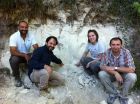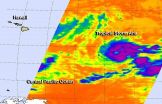(Press-News.org) Imagine the world waking up one morning to discover that all compasses pointed south instead of north.
It's not as bizarre as it sounds. Earth's magnetic field has flipped – though not overnight – many times throughout the planet's history. Its dipole magnetic field, like that of a bar magnet, remains about the same intensity for thousands to millions of years, but for incompletely known reasons it occasionally weakens and, presumably over a few thousand years, reverses direction.
Now, a new study by a team of scientists from Italy, France, Columbia University and the University of California, Berkeley, demonstrates that the last magnetic reversal 786,000 years ago actually happened very quickly, in less than 100 years – roughly a human lifetime.
"It's amazing how rapidly we see that reversal," said UC Berkeley graduate student Courtney Sprain. "The paleomagnetic data are very well done. This is one of the best records we have so far of what happens during a reversal and how quickly these reversals can happen."
Sprain and Paul Renne, director of the Berkeley Geochronology Center and a UC Berkeley professor-in- residence of earth and planetary science, are coauthors of the study, which will be published in the November issue of Geophysical Journal International and is now available online.
Flip could affect electrical grid, cancer rates
The discovery comes as new evidence indicates that the intensity of Earth's magnetic field is decreasing 10 times faster than normal, leading some geophysicists to predict a reversal within a few thousand years.
Though a magnetic reversal is a major planet-wide event driven by convection in Earth's iron core, there are no documented catastrophes associated with past reversals, despite much searching in the geologic and biologic record. Today, however, such a reversal could potentially wreak havoc with our electrical grid, generating currents that might take it down.
And since Earth's magnetic field protects life from energetic particles from the sun and cosmic rays, both of which can cause genetic mutations, a weakening or temporary loss of the field before a permanent reversal could increase cancer rates. The danger to life would be even greater if flips were preceded by long periods of unstable magnetic behavior.
"We should be thinking more about what the biologic effects would be," Renne said.
Dating ash deposits from windward volcanoes
The new finding is based on measurements of the magnetic field alignment in layers of ancient lake sediments now exposed in the Sulmona basin of the Apennine Mountains east of Rome, Italy. The lake sediments are interbedded with ash layers erupted from the Roman volcanic province, a large area of volcanoes upwind of the former lake that includes periodically erupting volcanoes near Sabatini, Vesuvius and the Alban Hills. Italian researchers led by Leonardo Sagnotti of Rome's National Institute of Geophysics and Volcanology measured the magnetic field directions frozen into the sediments as they accumulated at the bottom of the ancient lake.
Sprain and Renne used argon-argon dating, a method widely used to determine the ages of rocks, whether they're thousands or billions of years old, to determine the age of ash layers above and below the sediment layer recording the last reversal. These dates were confirmed by their colleague and former UC Berkeley postdoctoral fellow Sebastien Nomade of the Laboratory of Environmental and Climate Sciences in Gif-Sur-Yvette, France.
Because the lake sediments were deposited at a high and steady rate over a 10,000-year period, the team was able to interpolate the date of the layer showing the magnetic reversal, called the Matuyama-Brunhes transition, at approximately 786,000 years ago. This date is far more precise than that from previous studies, which placed the reversal between 770,000 and 795,000 years ago.
"What's incredible is that you go from reverse polarity to a field that is normal with essentially nothing in between, which means it had to have happened very quickly, probably in less than 100 years," said Renne. "We don't know whether the next reversal will occur as suddenly as this one did, but we also don't know that it won't."
Unstable magnetic field preceded 180-degree flip
Whether or not the new finding spells trouble for modern civilization, it likely will help researchers understand how and why Earth's magnetic field episodically reverses polarity, Renne said.
The magnetic record the Italian-led team obtained shows that the sudden 180-degree flip of the field was preceded by a period of instability that spanned more than 6,000 years. The instability included two intervals of low magnetic field strength that lasted about 2,000 years each. Rapid changes in field orientations may have occurred within the first interval of low strength. The full magnetic polarity reversal – that is, the final and very rapid flip to what the field is today – happened toward the end of the most recent interval of low field strength.
Renne is continuing his collaboration with the Italian-French team to correlate the lake record with past climate change.
INFORMATION:
Renne and Sprain's work at the Berkeley Geochronology Center was supported by the Ann and Gordon Getty Foundation.
ITHACA, N.Y. – Scientists have sequenced the house fly genome for the first time, revealing robust immune genes, as one might expect from an insect that thrives in pathogen-rich dung piles and garbage heaps.
The research, published Oct. 14 in the journal Genome Biology, will increase understanding of house fly genetics and biology and of how flies quickly adapt to resist insecticides, which could lead to novel control methods.
Adult house flies (Musca domestica) carry and transmit more than 100 human and animal diseases, including salmonellosis, anthrax, typhoid ...
NASA's Aqua satellite passed over Tropical Storm Ana on Monday, Oct. 13 after it formed in the Central Pacific Ocean.
Ana formed on Oct. 13 at 5 p.m. EDT (11 a.m. HST) as Tropical Depression 2-C, about 920 miles (1,480 km) east-southeast of Hilo, Hawaii. By 9 p.m. EDT that day, the depression had strengthened into Tropical Depression Ana.
NASA's Aqua satellite passed over Tropical Storm Ana on Monday, Oct. 13 at 11:11 UTC (7:11 a.m. EDT) and the Atmospheric Infrared Sounder or AIRS instrument gathered infrared data that showed some strong thunderstorms and cold cloud ...
WASHINGTON, DC— The 1934 drought was by far the most intense and far-reaching drought of the last 1,000 years in North America, and was caused in part by an atmospheric phenomenon that may have also led to the current drought in California, according to a new study.
New research finds that the extent of the 1934 drought was approximately seven times larger than droughts of comparable intensity that struck North America between 1000 A.D. and 2005, and nearly 30 percent worse than the next most severe drought that struck the continent in 1580.
"We noticed that ...
One of the planet's leading questions is how to produce enough food to feed the world in an increasingly variable climate. The Food and Agriculture Organization of the United Nations predicts that food production must rise 70% over the next 40 years to feed a growing global population, and plants are one major component of the necessary rise in food production. Plants—grains, cereals, fruits, vegetables, and more—feed humans directly and indirectly by supporting livestock. Current research must tap into our knowledge of how plants work to develop more efficient ...
From AGU's blogs: Health check reveals how glacier is declining due to warming climate http://blogs.agu.org/geospace/2014/10/13/health-check-reveals-glacier-declining-due-warming-climate/
Researchers from the British Geological Survey have taken the very first comprehensive health check of a rapidly melting glacier. Their latest study reveals that their icy patient, the Falljökull glacier in southeast Iceland, has been dramatically declining as it tries to adjust to recent changes in the climate.
The new findings on Falljökull show unhealthy changes in the ...
URBANA, Ill. – For about a decade, Chinese consumers weren't getting what they paid for when they purchased Wuchang, a special brand of gourmet rice that has a peculiar scent. The quality was being diluted when less expensive rice was aromatized, added to the packages of the high-quality rice, and sold at the premium price. Researchers at the University of Illinois studied how the tampering scandal affected the public's perception of risk and their subsequent behavior.
Because public anxiety over the fake rice issue was more pronounced in urban districts, the researchers ...
A Mount Sinai-led research team has discovered a new kind of stem cell that can become either a liver cell or a cell that lines liver blood vessels, according to a study published today in the journal Stem Cell Reports. The existence of such a cell type contradicts current theory on how organs arise from cell layers in the embryo, and may hold clues to origins of, and future treatment for, liver cancer.
Thanks to stem cells, humans develop from a single cell into a complex being made up of more than 200 cell types. The original, single human stem cell, the fertilized embryo, ...
Montreal, October 14, 2014 – High doses of fish oil supplements, rich in omega-3 fatty acids, do not reduce atrial fibrillation, a common type of irregular heartbeat in which the heart can beat as fast as 150 beats a minute. The results of the AFFORD trial led by the Montreal Heart Institute were published in the Journal of the American College of Cardiology on October 7th.
For the trial, 337 patients with atrial fibrillation not receiving conventional antiarrhythmic therapy were randomly assigned to 4 grams of fish oil a day or to placebo for up to 16 months. 64.1 ...
Can you ditch the strips and dump the dentist for whiter teeth? From "The Dr. Oz Show" to YouTube videos, experts say you can reclaim those pearly whites simply by mixing fruit, such as strawberries, with some baking soda, and applying the all-natural concoction to your teeth.
It's cheap, easy, and oh-so-organic. But does it work?
Unfortunately not, says an University of Iowa dental researcher, who compared a homemade strawberry-baking soda recipe with other remedies, such as over-the-counter products, professional whitening, and prescribed whitening products.
The ...
Almost exactly three years ago, the United Nations called on governments and industry to ensure that the world's population would have access to broadband Internet by 2015.
Broadband, a relatively fast and always-on Internet connection service, is one of the most economically significant and fastest growing sectors of the Internet.
"Over the past few years, a growing importance has been placed on broadband, and national plans have emerged to ensure coverage," said Fabian Bustamante, professor of electrical engineering and computer science at Northwestern University's ...



